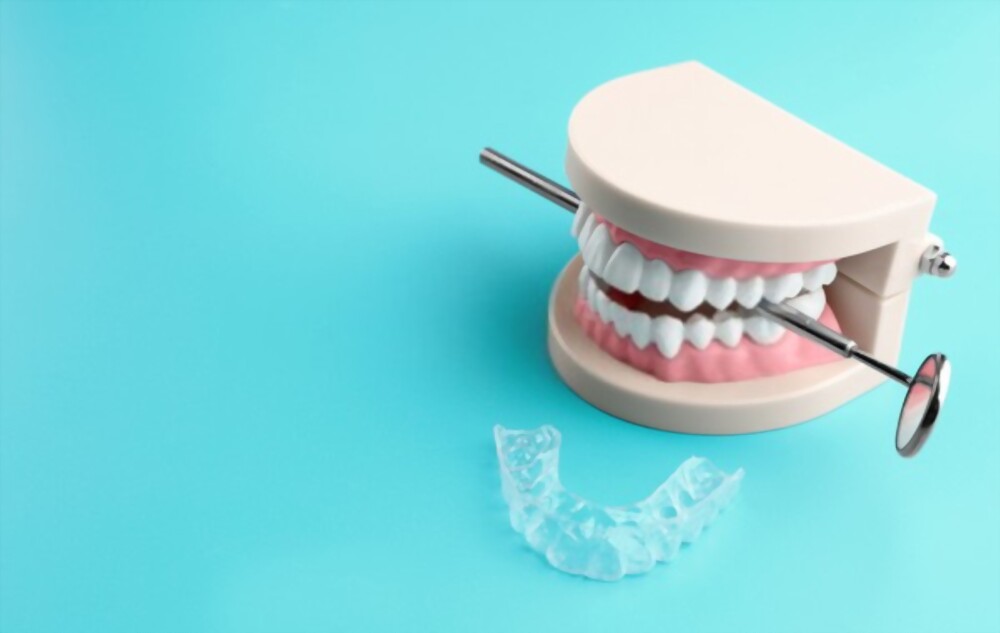
The world became increasingly stressful for most people around the globe as the initial shock and aftershocks of Covid-19 hit. It is likely that with increased stress, more teeth were grinding and jaws were clenching – a condition called bruxism.
“If you find yourself clenching your jaw throughout the day, or you wake up with sensitive teeth, a sore jaw, or a headache, you might suffer from bruxism—grinding, clenching or gnashing of the teeth,” according to a Cedars-Sinai blog post. “This teeth-grinding and jaw-clenching habit is a common condition that affects up to one-third of adults in the daytime and more than 1 in 10 in their sleep.”
It is often a painful condition that generally goes undiagnosed until a visit with a dentist or orthodontist.
“Many people don’t even realize they have bruxism until they are sitting in my office and I am telling them of the physical signs I am seeing. People often clench their jaws unconsciously throughout the day and a lot of people grind their teeth at night,” Dr. Vivek Cheba, a Calgary-based orthodontist, said. “This can not only produce discomfort like jaw pain and headaches but can have long term consequences on your teeth.”
Dr. Katayoun Omrani explained to Cedars-Sinai that the causes of bruxism can be different for each person – including factors linked to psychological, physical or genetic problems.
Substances like caffeine, tobacco, illicit drugs, and alcohol can also increase the likelihood of teeth-grinding.
Pain usually leads people to seek treatment if it becomes too noticeable before a visit to a dentist or orthodontist.
“A lot of people don’t realize they’re grinding until they’re told by a sleep partner or they develop migraines or wake up with sore muscles or stiffness,” Dr. Omrani told Cedars-Sinai.
Symptoms and signs include things like chipped or cracked teeth, facial pain, tense jaw muscles, headaches, dislocation or locking of the jaw and wearing away the tooth enamel.
“Obviously, it is best to diagnose and treat bruxism early – particularly before tooth enamel begins wearing away or teeth begin chipping and cracking,” said Dr. Cheba.
Bruxism is often caused by too much stress and certain personality types are more prone to it, according to Johns Hopkins Medicine: “Bruxism often affects people with nervous tension, such as anger, pain, or frustration. It also affects people with aggressive, hurried, or overly competitive tendencies. There is some proof that in some people, bruxism is caused by an imbalance in brain neurotransmitters. Also, some medicines, such as the antidepressants fluoxetine and paroxetine, can cause bruxism.”
Treatment for bruxism is done with considerations of age, overall health, and how well patients are likely to deal with different medications, procedures, and therapies.
Treatment can include behavior changes like learning how to rest the teeth, lips, and tongue.
“You may also learn to rest the tongue upward to relieve discomfort on the jaw while keeping the teeth apart and lips closed,” according to Johns Hopkins.
One common treatment is a mouthguard – a plastic mouthguard fitted to patients’ mouths that absorbs the tension from biting. It can be worn during the day as well to prevent injury to the teeth and assist in changing behavior.
“Antidepressant medications can cause it, so sometimes it is as simple as changing that medication,” added Dr. Vivek Cheba. “But this should always be done under close supervision of your primary care physician.”
One fascinating new and effective treatment is biofeedback, which “involves using an electronic instrument to measure the amount of muscle activity of the mouth and jaw. It then signals you when there is too much muscle activity so you can take steps to change that behavior. This is especially helpful for daytime bruxism,” according to the Johns Hopkins article.
More research is required in order to develop a biofeedback treatment program for people who clench their jaws during the night.
“During sleep, people generally aren’t aware of their teeth grinding and can apply substantial pressure — up to 250 pounds of force,” according to the Sleep Foundation.
There is currently no cure, but “treatment can reduce its frequency, decrease its impact, and relieve symptoms. In addition, home care tips can make it easier to cope with sleep bruxism.”
Those who are suffering from bruxism would do well to avoid hard foods like hard candies and popcorn, be cautious with sticky foods, not chew gum, and seek out additional head or neck support at night.
A great home remedy for the pain caused by bruxism is an ice pack or a hot compress placed over the jaw.
“Bruxism can be painful and negatively impact peoples’ dental health and quality of life. It is important to talk with your dentist or orthodontist about treatment options,” said Dr. Cheba.